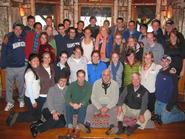
Over the weekend of October 1-2, the combined sections of Environmental Studies 220, The Cultural and Natural Histories of the Adirondacks, taught by Onno Oerlemans and Robin Kinnel traveled to the Adirondack Park for some first-hand experience.
Hampered only slightly by the perennially rainy weather this fall, they stopped first at Tahawus (pronounced “Tahaws”) to see what remains of the National Lead titanium mine, previously the site of the McIntyre iron mine, which produced the first steel found in the United States. On the property are two open pits, now filled with water, each more than 400-feet deep. Nearby are the remains of the old McIntyre furnace, which the students explored thoroughly.
After lunch they hoped to travel up the Veterans Memorial Highway to the top of Whiteface, but the weather had socked it in, with visibility less than 10-feet. The unavailability of the nature trail plus the pouring rain clinched the decision to beat a retreat and head for great Camp Wenonah, where the class was to stay overnight as the guests of Jim ‘68 and Anne Schoff.
After a warm welcome and gracious dinner the class heard a presentation by Sean Ross, a forester with Lyme Timber, which proposed to harvest trees sustainably on a 300-acre tract it owns across the street from the Schoffs. The presentation was directed at a town planning board, composed of Professor Oerlemanns, Jim Schoff and Dennis Phillips, a friend of the Schoffs and a lawyer from Glens Falls who has masterminded these evening “seminars” for a number of years.
In this fictional exercise students learned that this particular town requires timber harvesters to obtain a permit, so a public hearing was requested. After Ross’ thorough and educational presentation, a lawyer “hired” by Anne Schoff presented her objections. The Board then “voted” in a split decision in favor of Lyme Timber.
But because it was a split decision, the Schoffs appealed, and after hearing more arguments, the class was cast in the role of the appellate judge to decide if the decision was “arbitrary and capricious.” They unanimously upheld the decision of the planning board. It was mostly a contrived case, but Ross’ presentation provided precisely the kind of information required by several other state mandates for harvesting timber. The situation also reflected a similar legal problem handled by Dennis Phillips earlier. The students were captivated by the experience and raised many important questions during the public hearing part of the evening.
After breakfast provided by the Schoffs, the class departed for the Wild Museum in Tupper Lake, a few minutes away from Camp Wenonah. This natural history museum provides a wealth of educational exhibits about the flora, fauna and geology of the Adirondacks. The highlight for all was the otter pool. The class lunched at the museum in their Boreal Room, then traveled to Blue Mountain, where they explored the Adirondack Museum, which deals more with the historical and cultural aspects of the Adirondack Park. This weekend the museum entertained its yearly Adirondack Harvest Festival, featuring a variety of crafts and food items.
Many of the students took the opportunity to make (and eat) s’mores at that exhibit. The art exhibit featured a large collection of Arthur Fitzwilliam Tait’s paintings, which show a variety of mid-19th century Adirondack activities and helped to popularize the region for hunters and tourists.
Although the experiences were limited to two days (and 400 miles of riding in vans!) the breadth of experience, the stimulating evening seminar, and visits to the museums made this an excellent field trip for the 35 students and their instructors.
